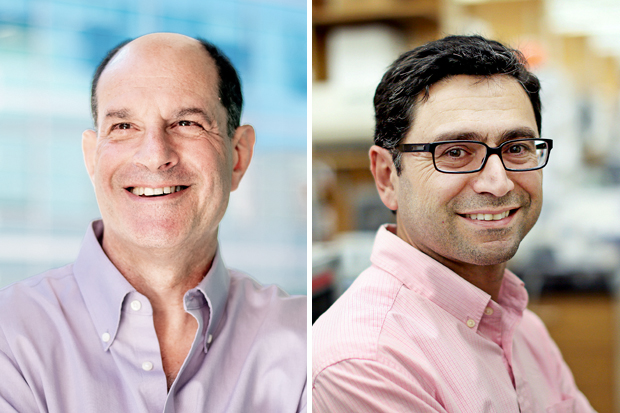Rosenstiel Award given to 2021 Nobel laureates
At a ceremony conducted via Zoom, scientists Ardem Patapoutian and David Julius received the prestigious prize.
 Noah Berger for UCSF and HHMI/Sandy Huffaker
Noah Berger for UCSF and HHMI/Sandy HuffakerJulius and Patapoutian
The Lewis S. Rosenstiel Award for Distinguished Work in Basic Medical Research has a notable record of recognizing scientists who were subsequently honored with Nobel Prizes. Thirty-six of the 90 Rosenstiel Award winners since 1971 subsequently won Nobels.
But this year was the first time the Rosenstiel winners attended the award ceremony having already won science's most prestigious prize.
Scientists Ardem Patapoutian and David Julius were officially announced the winners of this year's Nobel in Physiology or Medicine on October 4 for their discovery of the receptors that allow humans to feel temperature and touch.
The Rosenstiel Award ceremony was held eight days later via Zoom.
"David and Ardem will have the distinct honor of being the first Rosenstiel Award winners to attend the Rosenstiel ceremony as Nobel winners," President Ronald Liebowitz said in his opening remarks.
He said the Rosenstiel Award's emphasis on the basic sciences reflected the university's larger commitment to research in these areas.
"Exploring and advancing basic science and its relationship to medical research has been a fundamental pursuit of our university scientific community since its inception, making the Rosenstiel award a distinctly Brandeisian honor," he said.
Julius is professor and chair of the department of physiology at the University of California, San Francisco School of Medicine. His lab identified the channels that respond to heating and cooling the skin, leading to a broad understanding of how our bodies sense temperature.
Patapoutian is a Howard Hughes Medical Institute investigator in the department of neuroscience at Scripps Research in California.
Working independently of Julius, he and his colleagues contributed importantly to studies of temperature sensation and subsequently turned their attention to how the skin senses mechanical stimuli. They identified the Piezo channel proteins that enable touch sensing and proprioception.
The Rosenstiel Award was established as an expression of the conviction that educational institutions have an important role to play in the encouragement and development of basic science as it applies to medicine.
In his acceptance speech, Julius called it "one of the greatest awards in American biomedical research."
The award for Julius and Patapoutian was originally announced in October 2019, but the ceremony was postponed due to the pandemic.
In introducing Patapoutian at this year's webinar, professor of biology Paul Garrity spoke of his remarkable life story growing up Armenian in Lebanon and then leaving the country in 1986 at age 18 to flee the civil war.
In the United States, Patapoutian worked as a pizza deliverer and horoscope writer at Armenian newspapers before going to UCLA and studying science.
Garrity and Patapoutian overlapped as graduate students in the lab of biologist Barbara J. Wold at Caltech. Garrity said Patapoutian's personality made him adept at following Wold's advice to seek solutions to science's big unanswered questions.
"Succeeding at this ... requires both a very high tolerance for failure and a fundamental belief that no matter how bleak things seem at the moment, it will all work out okay if you just work hard enough and stay pretty flexible," Garrity said. "Ardem's ability to remain upbeat and positive in the face of adversity has allowed him to thrive in many such scientific endeavors."
In his talk, Patapoutian said yes, he'd pursued science's big unanswered questions during his career but also always chose subjects knowing the scientific tools existed to find answers.
"Being aware of where science and technology are, what are the enabling technologies and what you can actually do ... is a very important aspect of finding the right project," he said.
Professor emeritus of biochemistry Chris Miller introduced Julius, saying he'd achieved several stunning breakthroughs during his career.
He described Julius' style as "famously notable" for "rigor and experimental design, execution and analysis, exposition flowing clear as a mountain stream, a palpable joy satisfying his raw curiosity through discovery, a swarm of talented trainees hatched out into their own careers who look back on their time in his lab with abiding affection, and a visual artist's knack for linking his science to everyday experience through beautiful illustrative images."
A full list of awardees can be found on the Rosenstiel prize's website.
Categories: Science and Technology





